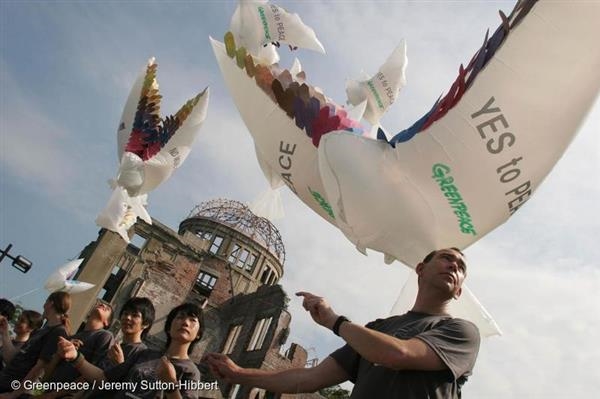By Junichi Sato*
6 August 2015 – The fight against nuclear is steeped in Greenpeace history. On the 70th anniversary of the Hiroshima bombings we’re reminded of the consequences of nuclear energy and the people’s movement to campaign for nuclear disarmament to create a safer and sustainable future for the people of Japan and the world.
Seventy years ago, the world’s first atomic bombs were dropped on the Japanese cities of Hiroshima and Nagasaki, creating a “mushroom cloud” and killing more than 450,000 people.
The horror of these bombings has been an eternal memory for survivors, imprinted on the consciousness of people around the world, and a reminder of holding the further use of nuclear weapons in warfare at bay.
Fast-forward to 2011 when a tsunami, triggered by a magnitude earthquake measuring 9.0 rocked the northern part of Japan, resulting in the Fukushima Daiichi nuclear disaster.

A girl with her face painted with the words ‘No war’ during a protest in March 2003 against the impending US-led war against Iraq.| Greenpeace/Jeremy Sutton-Hobbert
As the largest nuclear accident since Chernobyl in 1986, tens of thousands of people living within 20km of the zone were forced to evacuate, uprooting livelihoods and turning entire villages into ghost towns.

The Yokosuka peace fleet protest the presence of a nuclear armed US warships in Yokosuka harbor, Japan, in July 1990. | Credit: Greenpeace
Despite government efforts to decontaminate the zone Greenpeace Japan investigations continue to find that radiation levels radiation levels are still far too high for former residents to safely return.
In the Iitate district in the northeast of Fukushima prefecture, one of the worst affected and highly contaminated areas, radiation is still so widespread and at such a high level that those who were evacuated cannot return home safely.
However, the Japanese government wants to bring them back, announcing a “forced return policy” by March 2017 and terminating compensation by 2018.

The Yokosuka Peace Fleet protest against the presence of the nuclear warship USS MIDWAY in Yokosuka, Japan, in April 1991. | Greenpeace/Naoko Funahashi
The Abe administration seems determined to ignore the lessons of the past. It is doggedly pursuing the restart of nuclear reactors, in spite of the ongoing nuclear crisis in the Fukushima Daiichi impacted regions.
In addition, the current Abe administration has changed Japan’s long running peace constitution, which was adopted shortly after World War II, to enable Japanese troops to participate in armed combat.

Protest on the anniversary of the Hiroshima bombing in 1990, in Hiroshima, Japan. | Greenpeace / John Sprange
We’ve seen the effects of war. We’ve seen the effects of nuclear. Greenpeace believes that peace is the best self-defence, and that war is the biggest threat to the environment.
The Prime Minister of Japan, Shinzo Abe, should promise ‘no war and lasting peace’ to honour the 70th anniversary of Hiroshima and Nagasaki and more importantly to leave a peaceful world for generations to come.
*Junichi Sato is the Executive Director at Greenpeace Japan.
Sato’s article was published on Greenpeace. Go to Original.










